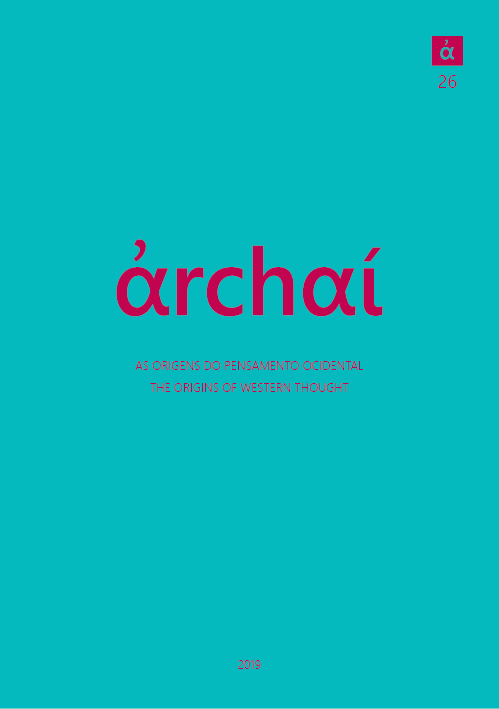Plato and Iris Murdoch
Good, Love, and the Recovering of Ancient Virtue Ethics in British Moral Philosophy
DOI:
https://doi.org/10.14195/1984-249X_26_3Keywords:
Plato, Good, Iris Murdoch, loveAbstract
Since G. E. M. Anscombe’s famous article Moral Modern Philosophy was published in 1958, a consensus has been established around the moral philosophy’s need for expanding its analysis agenda beyond the notion of duty and obligation. This movement has resulted in the recovery of ancient moral conceptions focused on the constitution of a virtuous character and happiness, especially under the influence of Aristotle and Stoic philosophers. In this paper, I intend to show that the British novelist and philosopher Iris Murdoch engaged in this movement assuming some central notions of Plato’s moral philosophy as part of her criticism against the British moral philosophy of her age. Such criticism contends the replacement of the modern notion of a rational will by other platonic ideas, especially “love” and “Good”, understood as parts of an objective model of moral guidance. Unlike Plato, however, the Good and its power of engagement and attraction were not characterized in a metaphysical way but as a peculiar psychological and moral notion. Following Freud’s psychoanalysis, the Good is conceived as part of XX lovely attention to the other and as a desire to see the reality behind our egoism and the pitfalls of imagination, which gives a psychological-naturalistic flavor to Murdoch’s claim from Plato’s philosophy.
Downloads
References
ANNAS, J. (1993). The Morality of Happiness. New York, Oxford University Press.
ANSCOMBE, G. E. M. (1958). Modern Moral Philosophy. Philosophy 33, p. 1-19.
ANTONACCIO, M. (2000). Picturing the human: the moral thought of Iris Murdoch. New York, Oxford University Press.
BARKER, E. (1978). Teoria Política Grega. Brasília, UnB.
BLUM, L. (2012). Visual Metaphors in Murdoch’s Moral Philosophy. In: BROACKES, J. (ed.). Iris Murdoch, Philosopher. A collection of Essays. Oxford, Oxford University Press, p. 307-325.
COTTINGHAM, J. (1998). Philosophy and Good Life. Oxford, Oxford University Press.
CRISP, R.; SLOTE, M. (eds.) (1997). Virtue Ethics. Oxford, Oxford University Press.
FOOT, P. (1978). Virtues and Vices. Oxford, Blackwell.
GOLDIE, P. (2007). Seeing what is the kind thing to do: perception and emotion. Dialethica 61, n. 3, p. 347-361.
HURSTHOUSE, R. (1999). On Virtue Ethics. Oxford, Oxford University Press.
HURSTHOUSE, R.; PETTIGROVE, G. (2016). Virtue Ethics. The Stanford Encyclopedia of Philosophy (Winter 2016 Edition). Edward N. Zalta (ed.). Available at https://plato.stanford.edu/archives/win2016/entries/ethics-virtue/.
KAMTEKAR, R. (2004). Situationism and Virtue Ethics on the Content of Our Character. Ethics 114, p. 458-491.
LOUDEN, R. (1992). Morality and Moral Theory: a reappraisal and reaffirmation. New York, Oxford University Press.
MCDOWELL, J. (1979). Virtue and Reason. The Monist 62, n. 3, p. 331-350.
MERRITT, M; DORIS, J.; HARMAN, G. (2010). Character. In: DORIS, J. The Moral Psychology Handbook. Oxford, Oxford University Press, p. 355-401.
MURDOCH, I. (1993). Metaphysics as a Guide to Morals. London, Allen Lane/Penguin Press.
MURDOCH, I. (1998). Existencialists and Mystics. London, Penguin.
MURDOCH, I. (2001). The Sovereignty of Good. London, Routledge.
MURDOCH, I. (2013). A soberania do Bem. São Paulo, Edusp.
PEREIRA, M. H. R. (trad.) (1985). Platão. A República. Lisboa, Calouste Gulbenkian.
PORCHAT, O. (2007). Rumo ao ceticismo. São Paulo, EdUNESP.
RODIS-LEWIS, G. (1981). Platón. Madrid, EDAF.
TRABATTONI, F. (2005). Platão. Trad. Gabriele Cornelli. São Paulo, Annablume.
Downloads
Published
How to Cite
Issue
Section
License
Given the public access policy of the journal, the use of the published texts is free, with the obligation of recognizing the original authorship and the first publication in this journal. The authors of the published contributions are entirely and exclusively responsible for their contents.
1. The authors authorize the publication of the article in this journal.
2. The authors guarantee that the contribution is original, and take full responsibility for its content in case of impugnation by third parties.
3. The authors guarantee that the contribution is not under evaluation in another journal.
4. The authors keep the copyright and convey to the journal the right of first publication, the work being licensed under a Creative Commons Attribution License-BY.
5. The authors are allowed and stimulated to publicize and distribute their work on-line after the publication in the journal.
6. The authors of the approved works authorize the journal to distribute their content, after publication, for reproduction in content indexes, virtual libraries and similars.
7. The editors reserve the right to make adjustments to the text and to adequate the article to the editorial rules of the journal.



